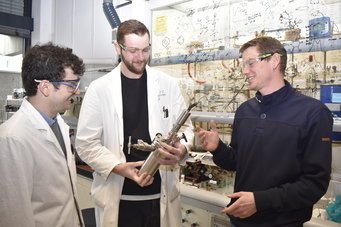Uganda has taken proactive steps to mitigate biorisks and govern dual-use research by being a pioneer country in the WHO African Region to pilot the Global guidance framework for the responsible use of the life sciences: mitigating biorisks and governing dual-use research (the framework). The Uganda Office of the Prime Minister was entrusted with coordinating this pivotal project in collaboration with the World Health Organization, recognizing its significance in enhancing national and regional biosecurity.
Since October 2023, key actions have been undertaken, including the national stakeholder engagement workshops. Notably, a stakeholders’ workshop to pilot the framework, which was held from 21 to 23 November 2023, gathered over 80 stakeholders from diverse sectors, fostering awareness and collaborative development of a draft roadmap for implementing the framework in the context of Uganda.
Subsequently, a technical stakeholders’ workshop, which was convened on 6 –7 March 2024, further reinforced awareness and strategic planning. Over 30 technical experts identified and defined key roles of stakeholders and refined the draft roadmap for effective operationalization of the framework.
A high-level stakeholders’ sensitization meeting was held on 15 March 2024, marking a significant milestone and showcasing Uganda’s dedication. Attended by over 50 high-level stakeholders, including government officials, heads of institutions, and WHO representatives, the meeting aimed to advocate and secure ownership, national buy-in, commitment and support for the framework’s implementation.
The opening remarks, led by Dr Monica Musenero, Honourable Minister of Science, Technology, and Innovation for Uganda, marked Uganda’s commitment to piloting the framework. Dr Musenero emphasized the need for robust biosafety, biosecurity and dual-use research governance, aligning with Uganda’s aspirations for sustainable development and global health security.
Dr Daniel Kyabayinze, Director of Public Health, Ministry of Health for Uganda, echoed this commitment, stressing the framework’s role in fostering ethical research practices amid health challenges like COVID-19. Representing WHO, Dr Andrew Niwagaba Bakainaga highlighted the framework’s transformative potential in enhancing research governance and promoting ethics and integrity. These remarks collectively underscored Uganda’s dedication to advancing responsible life sciences use through collaboration and innovation.
Several presentations were delivered to provide context to the meeting, including an overview of Uganda’s biosafety, biosecurity, and dual-use research governance capacity, laws, and regulations; the rationale for adopting and operationalizing the framework; an introduction to the pilot project; an overview of the framework; and the updated roadmap. Each presentation was followed by vibrant exchanges, discussions and concrete ways forward.
As a meeting outcome, the Minister of Science, Technology and Innovation made a strong commitment by taking the overall lead to advance the domestication and operationalization of the framework in Uganda and assigned the government chief scientist in collaboration with Uganda National Council of Science and Technology (UNCST) to ensure the technical lead in the process of domesticating and operationalizing the framework in Uganda under the general coordination of the Office of the Prime Minister.
The following next steps were agreed upon:
government cabinet meeting to sensitize relevant Ministries involved on the framework to adopt the Ministerial statement and commitment and start discussing the mobilization of domestic funding;
meeting with UNCST to harmonize the project implementation;
specification of roles and responsibilities and timeframe in the final roadmap for the domestication and operationalization of the framework in Uganda to keep accountability and measure collective successes;
continued bilateral meetings with other key stakeholders’ groups to secure their engagement and commitment as well as continued awareness raising activities; and
documentation and dissemination of Uganda’s experience and lessons learned on piloting the Global guidance framework for responsible use of life sciences
In summary, the Minister of Science, Technology, and Innovation outlined concrete actions to advance the framework’s implementation, emphasizing inter-ministerial collaboration and stakeholder commitment. These initiatives reflect Uganda’s proactive stance towards responsible life sciences use, effective governance of dual-use research and global health advancement.
A detailed report of this workshop will be published.





